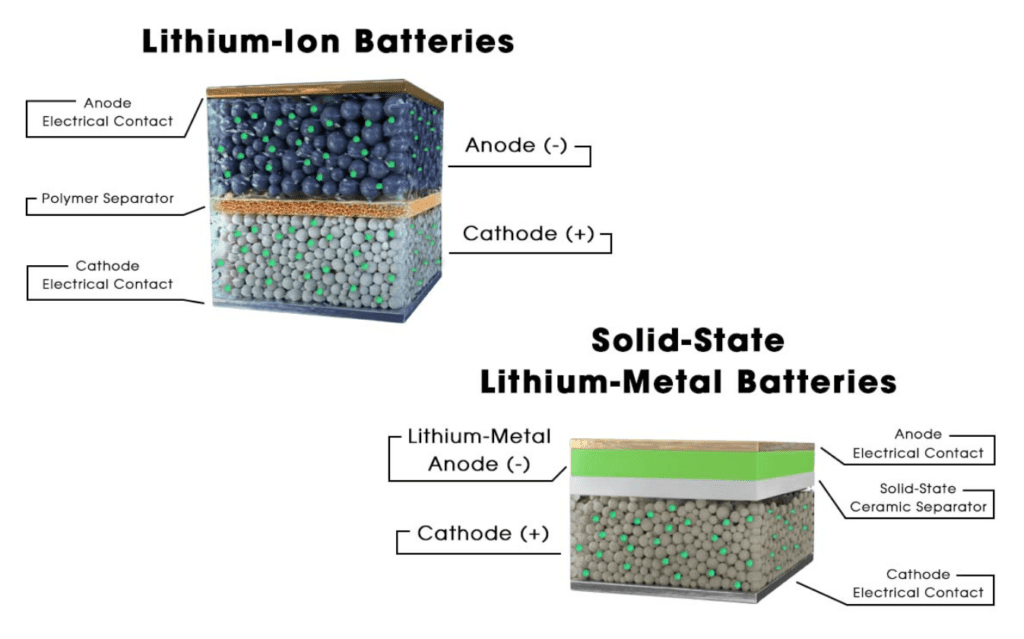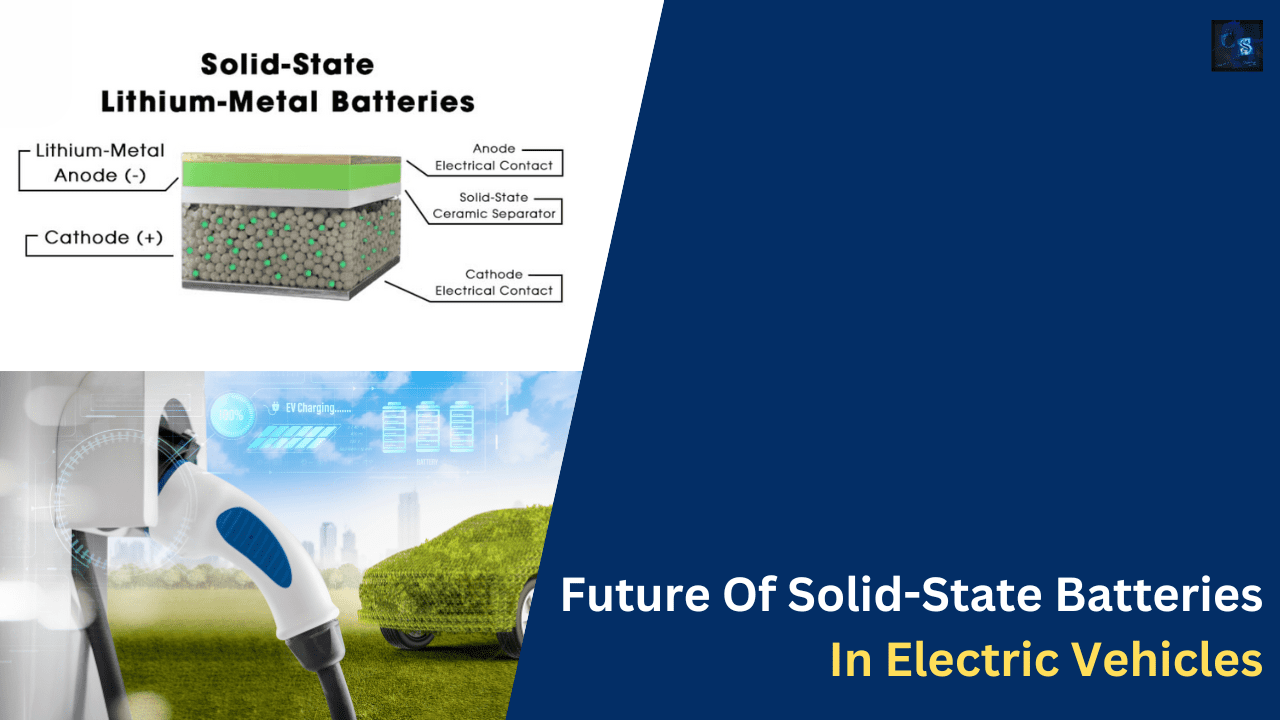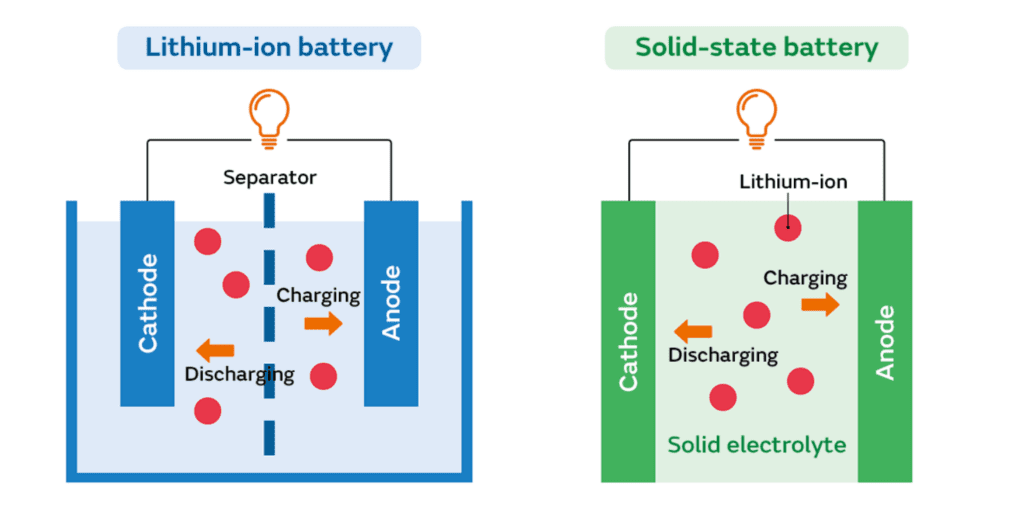Future Of Solid-State Batteries In Electric Vehicles
Hello guys, welcome back to our blog. Here in this article, we will discuss the future of solid-state batteries in electric vehicles and the challenges and limitations of solid-state batteries.
Ask questions if you have any electrical, electronics, or computer science doubts. You can also catch me on Instagram – CS Electrical & Electronics
- Convergence Of VLSI and Automotive Technologies: Driving Innovation In Modern Vehicles
- FuSa Functional Safety ISO26262 Interview Questions Asked In Benz, Daimler, Volvo, Qualcomm, Bosch, Automotive Companies
- Why Vector CANoe Is Most Popular in the Automotive Industry
Future Of Solid-State Batteries In Electric Vehicles
The rise of electric vehicles (EVs) is reshaping the automotive industry, driven by the need for sustainable and efficient transportation. However, the widespread adoption of EVs faces a significant challenge: battery technology. While lithium-ion (Li-ion) batteries have powered the transition to electric mobility, they come with limitations such as limited energy density, safety concerns, and long charging times. Solid-state batteries (SSBs) have emerged as the next-generation battery technology that promises to overcome these challenges. This article explores the future of solid-state batteries in EVs, their advantages, challenges, key industry players, and the expected timeline for adoption.
Understanding Solid-State Batteries
What Are Solid-State Batteries?
Solid-state batteries replace the liquid or gel electrolyte found in conventional Li-ion batteries with a solid electrolyte. This innovation allows for the use of new anode and cathode materials, leading to significant improvements in energy density, safety, and longevity.
Key Components of Solid-State Batteries

- Solid Electrolyte: A non-flammable material that replaces traditional liquid electrolytes, preventing leakage and fire hazards.
- Cathode: Typically made from lithium metal oxides or other advanced materials that enhance energy storage capacity.
- Anode: Unlike Li-ion batteries that use graphite anodes, SSBs can use lithium metal anodes, offering higher energy storage potential.
Advantages of Solid-State Batteries
01. Higher Energy Density
- Solid-state batteries can store more energy per unit volume than conventional Li-ion batteries.
- This means EVs can achieve longer driving ranges with the same battery size or reduce battery size while maintaining range.
02. Improved Safety
- Traditional Li-ion batteries use flammable liquid electrolytes, which pose a fire hazard in case of thermal runaway.
- Solid-state batteries eliminate this risk due to their stable solid electrolytes.
03. Faster Charging Times
- The enhanced ionic conductivity of solid electrolytes allows for quicker charge rates.
- Some prototypes indicate charging times as low as 10 minutes compared to 30-60 minutes for current fast-charging Li-ion batteries.
04. Longer Lifespan
- SSBs experience less degradation over charge cycles, potentially lasting 2-3 times longer than Li-ion batteries.
- This reduces replacement costs for EV owners and enhances sustainability.
05. Wider Operating Temperature Range
- Solid-state batteries perform well in extreme temperatures without requiring extensive thermal management systems.
- This makes them ideal for applications in diverse climates.
Challenges and Limitations of Solid-State Batteries
01. High Manufacturing Costs
- Producing solid-state batteries involves expensive materials and complex fabrication processes.
- Mass production scalability remains a challenge.
02. Material and Design Challenges
- Finding the right solid electrolyte material that ensures stability and high ionic conductivity is still a work in progress.
- Dendrite formation (lithium metal filaments that can short-circuit the battery) remains a technical hurdle.
03. Scalability Issues
- While laboratory tests show promising results, transitioning from small-scale production to full-scale automotive applications is difficult.
- Consistency in manufacturing quality is crucial for commercialization.
04. Temperature Sensitivity
- Some solid electrolytes perform well at high temperatures but poorly at room temperature.
- Research is ongoing to develop materials that function optimally across all temperature ranges.
Technological Innovations Driving SSB Development
01. Advanced Materials Research
- Scientists are exploring various solid electrolytes, including ceramics (e.g., sulfides, oxides) and polymers.
- New lithium metal anode designs help prevent dendrite formation.
02. Manufacturing Breakthroughs
- Innovations in 3D printing and roll-to-roll processing techniques are being developed for large-scale battery manufacturing.
- Companies are investing in automated production lines to reduce costs.
03. AI and Machine Learning in Battery Design
- AI-driven simulations optimize battery performance, predicting material behaviors and enhancing design efficiency.
- This accelerates research and reduces time to market.
Key Industry Players & Their Progress
01. Toyota
- Toyota is one of the leading automakers investing heavily in solid-state batteries.
- The company aims to launch its first SSB-powered EV by 2027.
02. QuantumScape
- A Silicon Valley startup backed by Volkswagen, QuantumScape is making significant strides in SSB research.
- Its lithium-metal solid-state batteries claim to offer 80% charge in 15 minutes.
03. Samsung SDI & LG Energy Solution
- South Korean battery giants are actively developing commercial-scale solid-state batteries.
- They aim to launch them in high-end EVs before mass-market deployment.
04. Tesla
- Tesla has not heavily invested in solid-state batteries but continues to research next-gen battery technology.
- The company may integrate SSBs into its roadmap if breakthroughs occur.
Government Policies and Investments
01. Global Push for EV Battery Innovation
- The U.S., Europe, and China have launched initiatives to accelerate SSB research and commercialization.
- Governments are providing grants and tax incentives to companies developing SSBs.
02. Regulatory Challenges
- SSBs must meet strict safety and performance standards before mass adoption.
- Extensive testing and validation processes are required.
The Future of Solid-State Batteries in EVs
01. Expected Timeline for Mass Adoption
- Early adoption in premium EVs by 2027-2030.
- Wider availability in mainstream EVs by 2035 as manufacturing costs decrease.
02. Impact on EV Costs and Consumer Adoption
- Initially, EVs with SSBs will be more expensive, but costs will drop over time.
- Enhanced performance, longer lifespan, and improved safety will drive consumer interest.
03. Integration with Next-Gen EV Technologies
- Solid-state batteries will enable more efficient and compact EV designs.
- Potential for integration with autonomous and connected vehicle technologies.
Conclusion
Solid-state batteries represent a transformative leap in EV technology, promising higher energy density, improved safety, faster charging, and longer lifespan. While challenges such as high production costs and material limitations remain, continuous research and investment are driving progress toward commercialization. With leading automakers and tech companies investing in SSBs, the next decade could witness a significant shift from traditional Li-ion batteries to solid-state alternatives, ushering in a new era of electric mobility.
This was about the “Future Of Solid-State Batteries In Electric Vehicles“. Thank you for reading.
Also, read:
- 100 (AI) Artificial Intelligence Applications In The Automotive Industry
- 1000+ Automotive Interview Questions With Answers
- 2024 Is About To End, Let’s Recall Electric Vehicles Launched In 2024
- 50 Advanced Level Interview Questions On CAPL Scripting
- 7 Ways EV Batteries Stay Safe From Thermal Runaway
- 8 Reasons Why EVs Can’t Fully Replace ICE Vehicles in India
- A Complete Guide To FlexRay Automotive Protocol
- Adaptive AUTOSAR Vs Classic AUTOSAR: Which One For Future Vehicles?


